 Ed Halter
Ed Halter
Desperately seeking the rom and the com in Nicholas Stoller’s
bro-meets-’mo feature.
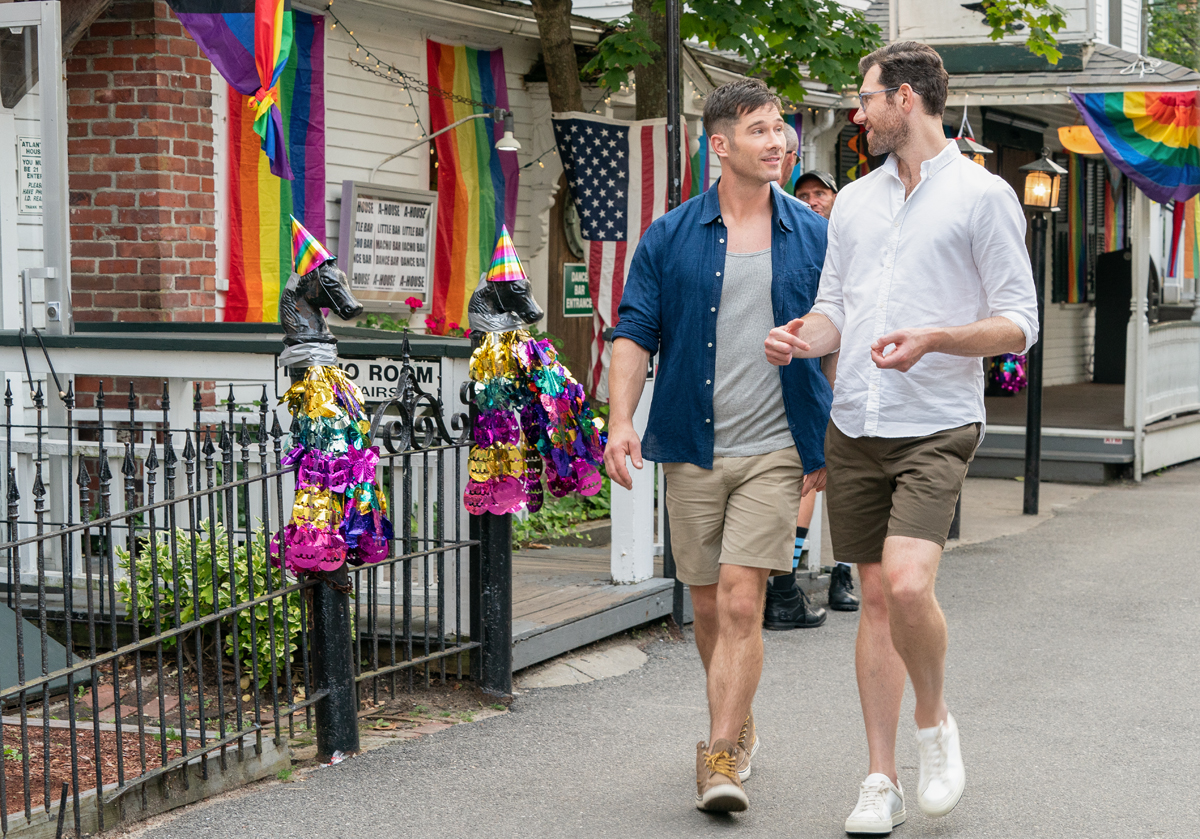
Luke Macfarlane as Aaron and Billy Eichner as Bobby in Bros. Courtesy Universal.
Bros, directed by Nicholas Stoller, now playing in theaters
• • •
Bros, the big-screen effort from internet-and-television funnyman Billy Eichner, the movie’s cowriter and star, was already raising red flags weeks before its debut thanks to the oft-repeated claim by Universal’s public-relations machine that it would be the first gay rom-com produced and released by a major Hollywood studio. This assertion had the whiff of desperation and insider cluelessness, not unlike art-world press releases that tout a painter’s “first solo exhibition at a major institution in North America,” implicitly arguing that the quality of the work will be guaranteed by the pedigree and financial status of the enterprise presenting it.
The downfall of such a claim, for movies at least, is that these distinctions matter primarily—if not exclusively—to those who work in the entertainment business itself. Most audiences today would need an annotated corporate flowchart to understand what makes Universal, a subsidiary of Comcast, any different from, say, Searchlight, a subsidiary of Disney, which released Andrew Ahn’s Fire Island, another gay rom-com, in June to viewers on Hulu, or for that matter Netflix, which produced and broadcast Darren Star’s gay rom-com series Uncoupled in July. And if we want to talk about who got there first, even these recent titles are rather late to the party: Jeffrey (1995) and Trick (1999) are just two of the notable independent releases of decades past that attempted to queer the genre, both cooked up by mini-major outfits of their day, and the teen-oriented feature Love, Simon was released to acclaim by Twentieth-Century Fox a mere four years ago, in 2018.

Luke Macfarlane as Aaron (top) and Billy Eichner as Bobby in Bros. Courtesy Universal.
But the problem with Bros goes deeper than its surrounding ballyhoo. As a film, Bros is tonally clumsy and narratively awkward, and fails to satisfy as either rom or com. Eichner’s movie is unable to decide whether it wants to deliver an earnest love story or a series of SNL-style parodies, and becomes far too invested in examining its own purported novelty and in bitterly shaming the faults of other attempts at gay representation.
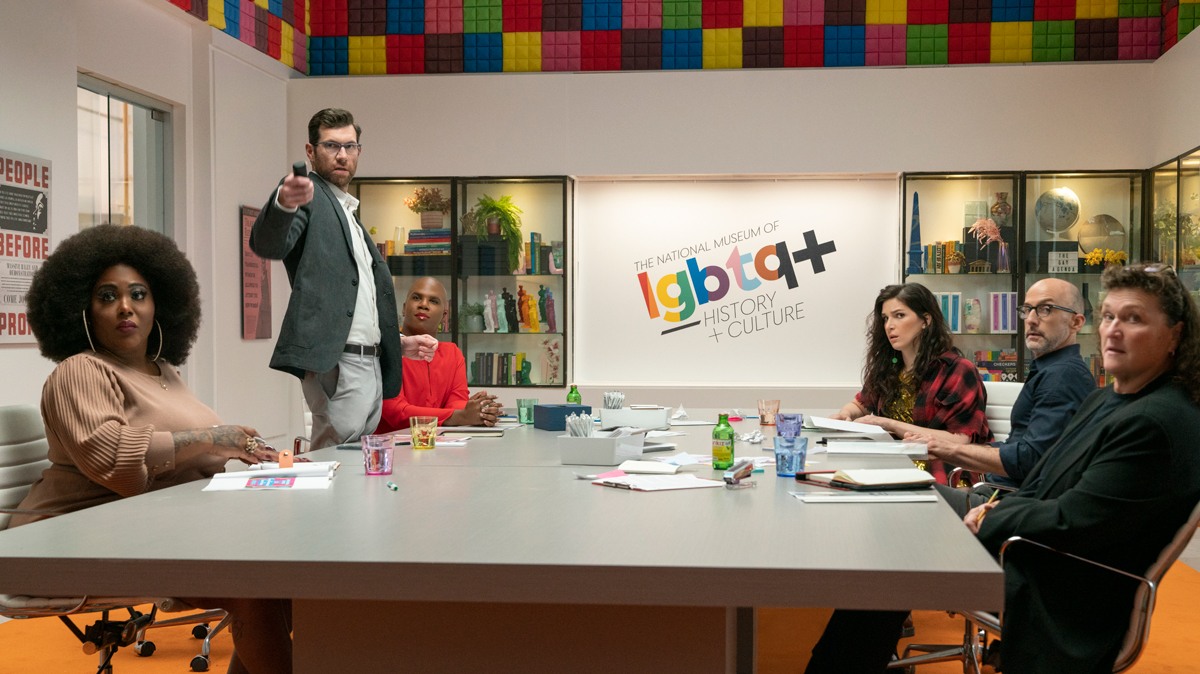
TS Madison as Angela, Billy Eichner as Bobby, Miss Lawrence as Wanda, Eve Lindley as Tamara, Jim Rash as Robert, and Dot-Marie Jones as Cherry in Bros. Courtesy Universal.
The film centers on Bobby (Eichner), a geeky, churlish podcaster and director of a soon-to-launch national LGBTQ+ Museum. As he relates to his podcast’s listeners at the start of the film, he is forty years old and has never been in a serious relationship. “Which is fine,” he says. “I love my life, I love my freedom, I love my independence.” We see Bobby engage in a nearly wordless Grindr hookup, in which the guy is hot but the sex is not, and then wander New York City streets musing on his own singledom as melancholy orchestral jazz plays in the background. “Between the weird sex with strangers that you don’t like and conversations with friends you love that you would never have sex with,” he continues to confess, more than a little defensively, to his pod’s audience, “you cobble together a version of a romantic single life. And it’s good. You know, it works. It’s a lot more than what a lot of other people have in this world. And you try to remember that.” (While Eichner toes the rom-com line here by insisting that his character can’t truly feel fulfilled without a relationship, in doing so, the film carelessly traffics in an aging-lonely-gay-man trope that generations have worked to extirpate.)
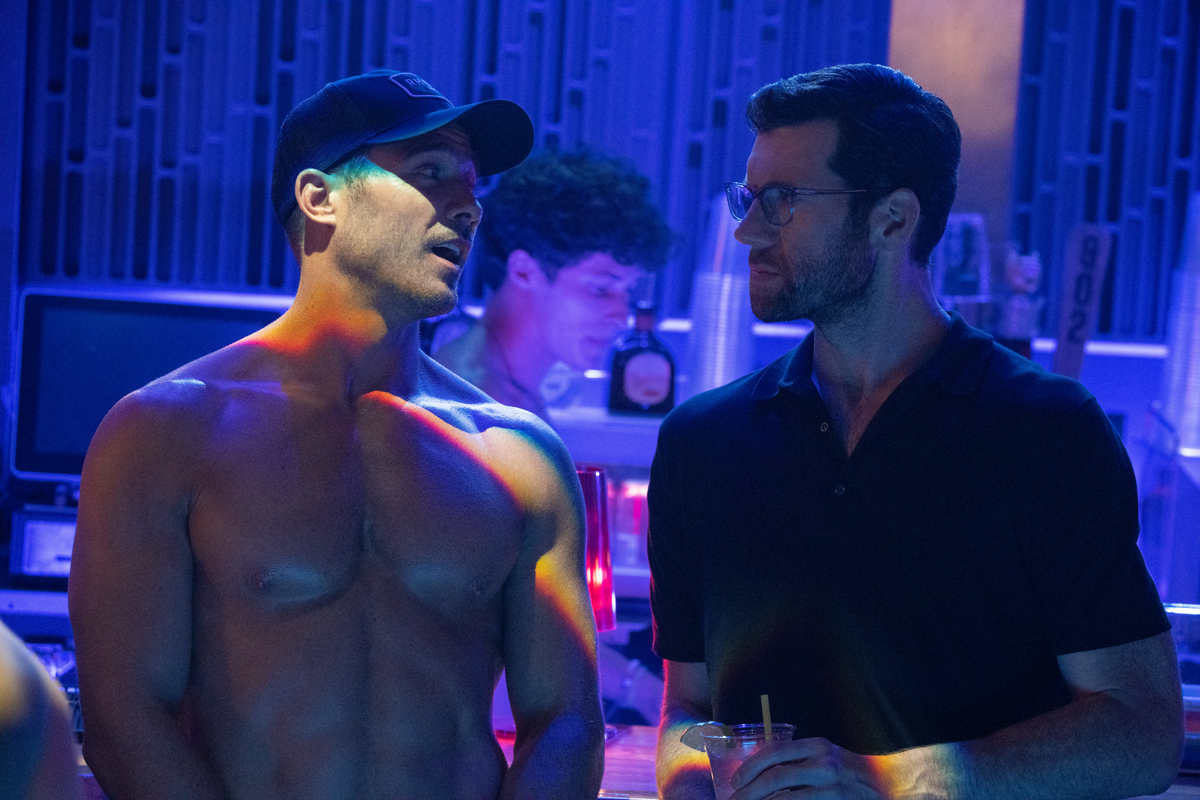
Luke Macfarlane as Aaron and Billy Eichner as Bobby in Bros. Courtesy Universal.
Later, Bobby spies muscular, masculine, shirtless Aaron (Luke Macfarlane) across the floor at a sweaty, thumping dance club. The two lock eyes and engage in banter; the requisite meet-cute is achieved and some chemistry seems to bubble up, but Aaron has other plans for the evening. “That guy’s hot, right?” he says to Bobby, pointing out one brawny torso writhing above the others. “I’m supposed to fuck him and his husband later.” Another impediment to what we already know will be their inevitable coupling emerges immediately afterward, as Bobby is aghast that Aaron can’t recognize the Mariah Carey song playing at the club. Turns out that square-jawed, baseball-capped Aaron is so straight-acting that he actually prefers Garth Brooks. Can a shrill ’mo vibe with a chill bro?
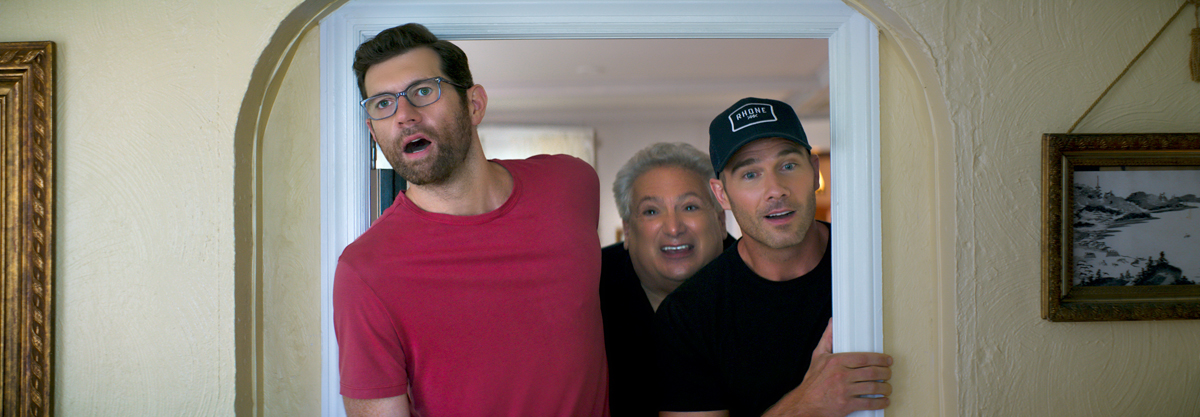
Billy Eichner as Bobby, Harvey Fierstein as Louis, and Luke Macfarlane as Aaron in Bros. Courtesy Universal.
With this setup in place, the film continues through various instances of the will-they-or-won’t-they episodes that traditionally drive romantic-comedy narratives; in loyal genre fashion, the guys get together, disband, and eventually reunite. In between, Eichner’s character provides an exhausting anthology of jokes riffing on gay pop culture and its inanities. We sit through a quick spoof of Queer Eye for the Straight Guy; witness some cameos from gay icons like Debra Messing, Harvey Fierstein, and Kristen Chenoweth; listen to unfavorable references to Schitt’s Creek and Bohemian Rhapsody; and attend a self-congratulatory LGBTQ+ awards show in which Bobby is named “cis white gay man of the year.” Few of the gags built around these moments are particularly funny, and their self-serving purpose is to skewer the superficiality of the media that gay people have been offered so far in favor of the supposed authenticity and sincerity of the movie we’re currently watching.
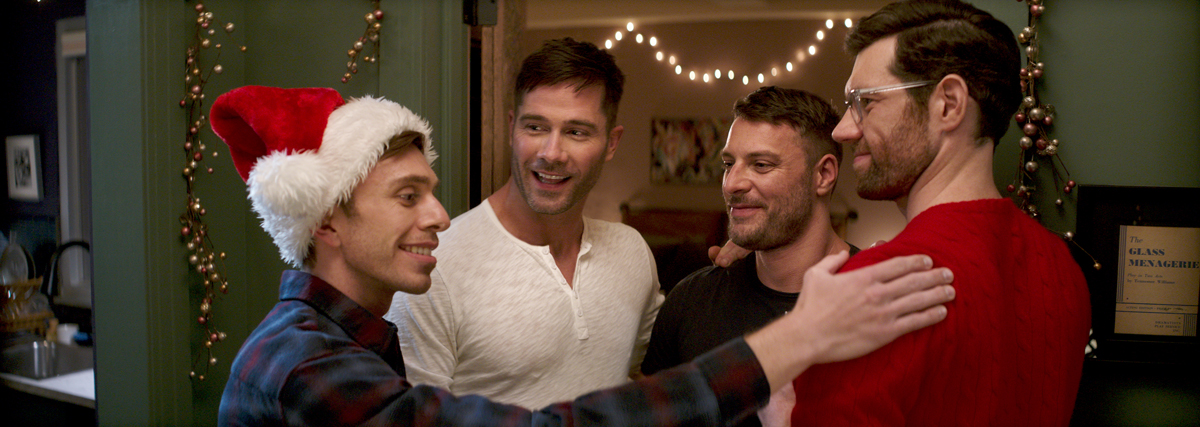
Brock Ciarlelli as Steve, Luke Macfarlane as Aaron, Ryan Faucett as Josh, and Billy Eichner as Bobby in Bros. Courtesy Universal.
Perhaps the most telling of Bros’ endless showbiz in-jokes are a series of digs at Hallmark Channel Christmas movies via mock trailers and posters for made-for-TV products designed to court queer viewers—not only gay-themed titles but bisexual and polyamorous fare as well (one spot announces the upcoming A Holly Poly Christmas). Cheesy Hallmark productions might be easy targets for comedy, but in their industrious abundance, they actually satisfy the rom-com itch far better than the torturously overproduced Bros, a problem that no amount of celebrity endorsements, cute poster designs, or manufactured press opportunities can solve. The real romance in crisis, it would seem, is that between big-budget Hollywood and its audiences, who long ago decided they’re satisfied enough with small-screen intimacies.
Ed Halter is a founder and director of Light Industry, a venue for film and electronic art in Brooklyn, New York, and Critic in Residence at Bard College in Annandale-on-Hudson, New York.